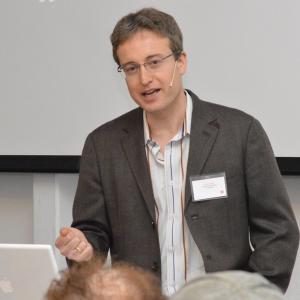
James Davies
University of California, Berkely
“Hearing with your eyes. Two studies exploring extra-musical factors on perception: body movement and subtitles.”
Music Colloquia provide a weekly forum for presentation and discussion of recent research by distinguished visitors and Case Western Reserve University faculty and graduate students in musicology, historical performance practice, and music education.
All Colloquia begin at 4:00 p.m. (Eastern Time) and will be offered virtually through the Fall 2020 semester. Members of the CWRU and wider Cleveland community are heartily welcome, as are students and colleagues at other institutions. For Zoom links to individual presentations, please contact Francesca Brittan, fmb22@case.edu.
James Q. Davies is Associate Professor of Music at the University of California, Berkeley. He is author of Romantic Anatomies of Performance (2014), co-editor of the volume Sound Knowledge: Music and Science in London, 1789-1851 (2016), and series editor of the book series New Material Histories of Music with University of Chicago Press. His current research project is a nineteenth-century history of music in the circum-Atlantic world told in relation to the medium of the air. Creatures of the Air, 1817-1913 explores sonic orders of environmentality, coloniality, and political ecology: ideas about breath control, ideas about air-conditioning systems in buildings, as well as ideas about music, civilization, and climate.
About Dr. Davies' talk:
Industrial systems of reproduction (musical reproduction not excepted) have been recognized as both the cause of and cure for the global climate crisis. This paper zeroes in on a key moment: when Birmingham UK hosted the premiere of the English version of Felix Mendelssohn’s oratorio Elijah in 1846. Associates and benefactors of Matthew Boulton and James Watt – inventors of the double-acting steam engine – financed Mendelssohn’s presence in England. This paper contributes to the growing disciplinary literature on the political ecology of music, by yoking Elijah to fossil-fuel industrialism and interdisciplinary debates about the onset of the Anthropocene. Further, it exposes well-meaning environmentalist and ecomusicological romanticizations of “Nature” as an anthropogenic, biotechnical, and catastrophist construct.
I argue that Mendelssohn’s oratorio was at once financed on the back of the profits of coal-fired energy systems, and produced by well-meaning environmentalists to mitigate against the effects of heavy air pollution. I show how the singing-class movement emerged as a reparative response to the modern economic “necessity” of a smoke-filled Victorian airscape. My paper links the history of biomedicine, public health discourse, and the history of air-purification systems to the prophetic rhetoric of such firebrand “modern Elijahs” as the contemporaneous preacher-evangelist John Cumming, whose love for Mendelssohn’s oratorio emerged from his conviction that Armageddon would occur on a date in 1864. Sacred choral song aligned with the “great sanitary awakening” both because of its allegedly sanctifying spiritual potential, and because it was thought to fortify the lungs of working populations. The problem of atmospheric hygiene yielded an environmental predicament for which public health initiatives were imagined a sustainable cure. Commissioned by municipal reformers, Elijah was conceived as a means of atmospheric repair and moral healing for “Black Country” populations. I conclude that Elijah deals in a cosmology – a way of narrating “Nature” – that begins with the very real experience of ecological crisis.

